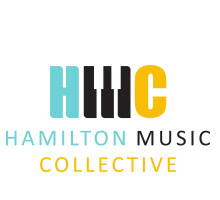Music as a Mental Health Tool amidst COVID-19
Wellness Program Helps Isolated Children and Adolescents
The Hamilton Music Collective’s “An Instrument For Every Child” (AIFEC) Program
has provided musical training to over 6,000 children and youth within some of
Hamilton’s most under-served communities. Taught by professional musicians, students
learn to sing, compose and play music on an instrument of their choice for free. A key
focus of the AIFEC Program has always been to build the confidence, self-esteem and
well-being of the students. HMC is passionate about music and believes in its
transformative power to enrich and empower lives. HMC is also committed to
invigorating the Hamilton music scene through professional live performances,
education, events, workshops and exhibits.
Recognizing the far-reaching benefits of music, especially for inner city children living in
poorer neighbourhoods, Hamilton School Boards, Boys and Girls Clubs, the City of
Hamilton Recreation and others have partnered with HMC to bring these life-affirming
programs to young people. HMC removes barriers for students who live in poverty; by
encouraging children to participate in music lessons, awarding grants to cover all
program expenses and by providing each participant with his/her instrument free of
charge for the duration of the program.
Recently, the Hamilton Bulldogs Foundation provided the needed funding to allow HMC
to launch a Music for Wellness Program, designed specifically to address mental health
issues in youth. Through song-writing and other forms of musical expression, guided by a
music therapist experienced in working with at-risk youth, the program and workshops
seek to address the issues that face so many young people today, such as isolation,
anxiety, and depression.
“The Bulldogs’ Foundation is focused on enriching the lives of
youth in our community. This is why we are proud to help bring HMC’s music program
to at-risk youth in Hamilton,” said Bulldogs’ Foundation Executive Director Peggy
Chapman. “Mental health is just as important as physical health. This is a perfect time,
during this incredibly challenging pandemic, for this program.”
The Wellness Programs are being created by Aimee Berends, (MMT, BMus, MA in
progress). A former principal oboist in the Guelph Symphony Orchestra, Aimee is a
Registered Music Therapist and freelance musician. Her clinical focus is mental health
and addictions. In addition to her work with HMC, she has conducted therapy programs
in Vancouver’s Downtown Eastside, has taught at Wilfred Laurier University and is a
guest lecturer at McMaster University.
Building on their Wellness Program, HMC has also developed a partnership with
Wellwood, to help support children who have a family member undergoing cancer
treatment. This Program connects professional instructors with groups of 6-8 children in
online workshops, where they’re safely able to explore and share their thoughts and
feelings.
HMC is also working with students in McMaster University’s Bachelor of Life Sciences
(Honours) Program to conduct community-focused research on the Wellness Program.
This research will help HMC plan and scale-up future programs, while also assessing the
Program’s impact on the participating children; helping to further fine-tune teaching
methods and therapy.
Helps Us Meet the Growing Need for Mental Health Therapy
Despite the pandemic, HMC continues to provide personalized online instruction to
hundreds of students. With the onset of COVID and the growing mental health issues
related to children’s isolation, HMC is now proactively seeking additional community
partners and funding support to expand the outreach of their Music for Wellness
Program.
“Given that we’re dealing with mental health issues tied to isolation, we obviously need
to connect our instructors more closely with our students, and we intend to return to in-
person lessons as soon as we can,” says HMC CEO Astrid Hepner. “We also see the need
for mental wellness initiatives growing significantly over the longer-term based on our
community feedback and national healthcare studies.” A recent poll conducted by
Children’s Healthcare Canada, in co-operation with the Pediatric Chairs of Canada,
shows 70 per cent of Canadians believe children will have long-term effects (physical
and mental) from the pandemic. 92% believe children need to be prioritized in COVID-
19 recovery plans. A recent Stats Can survey also reported that 71% of parents were very
(or extremely) concerned about their children’s loneliness or social isolation.
On a positive note, there is also a growing body of evidence confirming that music
provides effective, active therapy to help people cope with social distancing and self-
isolation. Music even boosts the body’s immune system by increasing production of
antibodies and cells that attack invading viruses.
A recent CBC article, quotes Music Therapist Dany Bouchard, who works in Montreal
General Hospital’s psychiatric and mental health services department; “Music, as we well
know is very powerful because it is a tool that brings you into the moment.” He further
advises that patients can “use music as mindfulness”.
Bringing music to children, gives them a positive opportunity for self-expression while
building confidence and self-esteem. The Canadian Mental Health Association estimates
that between 10 to 20 % of Canadian youth will experience mental illness. Over the past
decade, hospitalization rates for anxiety-related disorders amongst children have grown
from 20 to 187 per 100,000. ER visits for self-harm among young women under 20
increased by almost 30 per cent between 2014 and 2017. Sadly, these estimates are now
expected to rise even further in the aftermath of Covid isolation.
To find out more about Hamilton Music Collective’s Youth and Children’s Music Therapy Programs and how you can support the growing need for mental health therapy in our community, please visit: hamiltonmusiccollective.ca



